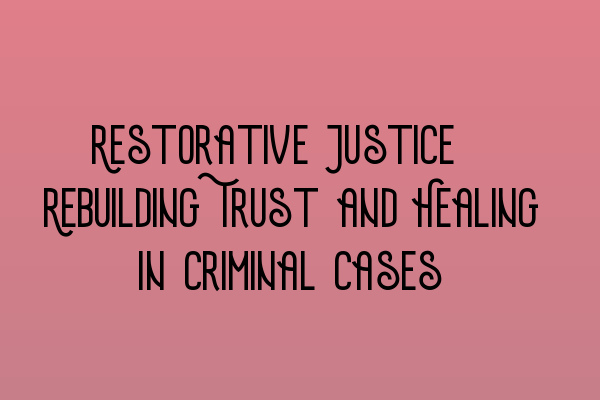Restorative Justice: Rebuilding Trust and Healing in Criminal Cases
In the criminal justice system, the prevailing approach has often been focused solely on punishing offenders rather than considering the needs of victims and the wider community. However, a growing recognition of the limitations of this punitive model has led to the emergence of alternative approaches, such as restorative justice.
Restorative justice is an approach that aims to address the harm caused by crime by focusing on repairing relationships, rebuilding trust, and promoting healing for all parties involved. Rather than solely relying on incarceration, restorative justice seeks to bring together victims, offenders, and the community to actively participate in a process of dialogue, accountability, and reconciliation.
One of the key principles of restorative justice is an emphasis on the needs and perspectives of victims. By providing them with the opportunity to ask questions, share their experiences, and seek answers, restorative justice allows victims to regain a sense of control and closure. This process can be incredibly empowering and help victims to find healing and move forward.
For offenders, restorative justice offers a chance to take responsibility for their actions and make amends. By facing the consequences of their behavior and hearing directly from those affected, offenders have an opportunity to develop empathy, gain insight into the impact of their actions, and actively work towards making positive changes in their lives. This can lead to a greater likelihood of rehabilitation and reintegration into society.
Restorative justice also recognizes the wider community as an essential stakeholder in the criminal justice process. Through community involvement, support, and engagement, restorative justice seeks to address the underlying causes of crime and foster a sense of collective responsibility for preventing future offenses.
While restorative justice may not be suitable for all cases, its application in appropriate situations can yield significant benefits. Studies have shown that restorative justice programs can lead to higher victim satisfaction rates, reduced recidivism, and a sense of closure for all parties involved.
At SQE Criminal Law & Practice Law UK, we firmly believe in the potential of restorative justice to transform the criminal justice system. Our team of experienced solicitors are well-versed in restorative justice practices and can provide expert guidance and support throughout the process.
If you would like to learn more about restorative justice and how it can be applied in criminal cases, please don’t hesitate to contact us for a confidential consultation. Together, we can work towards a system that not only punishes but also rebuilds, heals, and restores.
Related Articles:
Demystifying the Solicitors Qualifying Examination Format
LLC Formation Made Simple: Step-by-Step Guide for UK Entrepreneurs
LLC Formation: A Step-by-Step Guide for UK Entrepreneurs
Business Regulations in the UK: A Comprehensive Overview
Ethical Considerations in UK Law: Upholding Professional Standards
